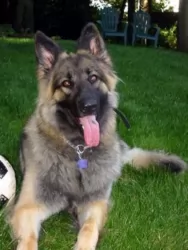 MyDogBreeds
MyDogBreeds Both Shorkie and Shiloh Shepherd are originated from United States. Shorkie may grow 6 cm / 2 inches shorter than Shiloh Shepherd. Shorkie may weigh 58 kg / 127 pounds lesser than Shiloh Shepherd. Both Shorkie and Shiloh Shepherd has almost same life span. Shorkie may have less litter size than Shiloh Shepherd. Shorkie requires Moderate maintenance. But Shiloh Shepherd requires High maintenance
Both Shorkie and Shiloh Shepherd are originated from United States. Shorkie may grow 6 cm / 2 inches shorter than Shiloh Shepherd. Shorkie may weigh 58 kg / 127 pounds lesser than Shiloh Shepherd. Both Shorkie and Shiloh Shepherd has almost same life span. Shorkie may have less litter size than Shiloh Shepherd. Shorkie requires Moderate maintenance. But Shiloh Shepherd requires High maintenance
 The Shorkie is a mix between a Yorkshire Terrier and a Shih Tzu. This little dog actually thinks he’s quite big. He is a great watchdog and a barker, and he is a loyal and loving member of his family. He will let you know if he thinks something is going on that shouldn’t be.
The Shorkie is a mix between a Yorkshire Terrier and a Shih Tzu. This little dog actually thinks he’s quite big. He is a great watchdog and a barker, and he is a loyal and loving member of his family. He will let you know if he thinks something is going on that shouldn’t be.
This hybrid combines two breeds known for their good looks, cuteness and personalities. Shorkies get their watchdog instincts and their loyalty to their people from the Shih Tzu and their personalities and good looks from the Yorkie. This designer breed has no known standard and every puppy is different, but traits from its founding breeds will remain. Both breeds have great personalities.
Regardless of the differences within the litter, because the personalities and adorableness of the two founding breeds are equal, all of the puppies will have those characteristics. They will all be energetic, playful and think they are big dogs. They will all love people and especially kids – playing and watching over them.
The Shorkie is intelligent, trainable, and snuggly. They will also have the stubborn trait that the two founding breeds can show at times. Developed in the United States, this crossbreed is extremely popular even though they have been in existence for only ten years or so. Breeders in the U.S. began to mix these two breeds in order to develop a cute, friendly and intelligent little dog that will cuddle on your lap – perfect lap dog.
Even if we already have breeds similar to the Shorkie, its development allows breeders to diversify and improve the genetics of the dogs. It is important that these be responsible breeders whose intentions are not financial but to legitimately improve the positive traits of each breed while sorting out the undesirable or weak traits. This is the positive side of the new designer breeds.
Even though it is still being developed, at least the Shorkie seems to be a success story for designer breeds as a loving, popular little dog. It will take a lot more time and a lot more development before the Shorkie becomes an actual recognized breed. At the moment it remains a hybrid, a crossbreed, a so called designer dog.
It will be at least 7-10 generations of careful and quality breeding before the Shorkies are potentially recognized as its own pedigree breed. It is important to breed Shorkies to Shorkies in order to develop a standard that could be accepted for a new breed by the AKC and UKC. Over time the puppies must become more and more standardized in their conformity to that new breed standard. Their physical appearance and their temperament will be standardized. At this stage the second generation of Shorkies is rare. Their popularity is rising in the United Kingdom. Both Britain and Ireland have a growing interest in this hybrid.
 The Shiloh Shepherd is currently a hybrid that breeders are attempting to develop into a new breed. New York breeder, Tina Barber, out of Shiloh Shepherds kennel developed dogs when in 1974, she attempted to develop a German Shepherd line. She wanted a GSD that was more like the ones she remembered from her childhood.
The Shiloh Shepherd is currently a hybrid that breeders are attempting to develop into a new breed. New York breeder, Tina Barber, out of Shiloh Shepherds kennel developed dogs when in 1974, she attempted to develop a German Shepherd line. She wanted a GSD that was more like the ones she remembered from her childhood.
Tina took her foundation stock out of the AKC and got the FIC (Federation of International Canines) to recognize the Shiloh Shepherd as a separate breed. The FIC is not the same as the FCI or Federation Cynoloquque Internationale. In 1991 the Shiloh Shepherd Dog Club of America was formed, and the shepherd was recognized by the American Rare Breed Association.
Official recordkeeping on the breed began in 1993. The computer system TCCP maintains breed records and the Shiloh Shepherd has at least 9 generations in the system. Tina Barber was president of the Shiloh Shepherd Dog Club of America and oversaw the international club as well. She was responsible for the breed. After her death in 2011, her daughter took her place in working with the breed.
The Shiloh and the German Shepherd were then crossed to develop the King Shepherd.
 The Shorkie, being a cross between the Yorkshire Terrier and the Shih Tzu, and as such has physical and temperament characteristics from both breeds. They could be 50-50 but most likely each puppy will be more like one of the founding parents than the other. Because there is a lot of similarity between the founding breeds there is a lot of similarity between the Shorkies.
The Shorkie, being a cross between the Yorkshire Terrier and the Shih Tzu, and as such has physical and temperament characteristics from both breeds. They could be 50-50 but most likely each puppy will be more like one of the founding parents than the other. Because there is a lot of similarity between the founding breeds there is a lot of similarity between the Shorkies.
Their hair is either wavy or straight, but it is soft. It can be a wide variety of colors and usually they have a darker mask on the face. Usually they have the eyes of the Shih Tzu – large -but not protruding. Their muzzle is short, and the skull is round with triangle ears. Their bodies are compact, small with plenty of muscle for their size. They also have fine bones and short legs, with a thin curled tail.
 Shiloh Shepherds are giant dogs, much larger than the usual German Shepherd Dog. The Shiloh had been bred to be a companion animal and not a guardian or herder. The Shiloh looks more like a wolf than either the German or the King Shepherd Dog. Their back is straighter than the GSD and they are larger, more stable and more intelligent. They were bred to show a complimentary balance between strength and elegance.
Shiloh Shepherds are giant dogs, much larger than the usual German Shepherd Dog. The Shiloh had been bred to be a companion animal and not a guardian or herder. The Shiloh looks more like a wolf than either the German or the King Shepherd Dog. Their back is straighter than the GSD and they are larger, more stable and more intelligent. They were bred to show a complimentary balance between strength and elegance.
They have slightly domed, broad heads with a muzzle that gradually tapers, strong cheekbones and black lips. Their ears are triangles, well cupped and firm. The Shiloh Shepherds eyes are either brown or very dark. They have a straight back which is muscular and broad. Their chests deep and their tails plush, long and curved.
They have a very “heavy” appearance compared with other shepherds. They are well muscled in both the lower and upper thighs. Their coat is plush, and they have a dense undercoat. Their hair is harsh to the touch. There is both a smooth coat and a plush coat with the plush coat being more prevalent.
 1.Children friendliness – yes, they are good with children. They are large however and have to be monitored with small children
1.Children friendliness – yes, they are good with children. They are large however and have to be monitored with small children
 Many hybrids are in better health at least genetically than their parent breeds. Responsible breeders will breed any genetic issues out of their puppies. Still there are many health issues that the Shorkies are prone to. These include:
Many hybrids are in better health at least genetically than their parent breeds. Responsible breeders will breed any genetic issues out of their puppies. Still there are many health issues that the Shorkies are prone to. These include:
• Brachycephalic Airway Syndrome – “smashed face” causes problems with breathing, heat, flying and more.
• Glaucoma – Yorkshires have this, and it can be secondary to the lens Luxation.
 The Shiloh Shepherd has some health issues to deal with. These include: They seem to have very sensitive stomachs and intestinal issues.
The Shiloh Shepherd has some health issues to deal with. These include: They seem to have very sensitive stomachs and intestinal issues.
• Bloat – gastric dilatca ation volvulus – twisted stomach or intestines. Needs immediate veterinary care.
• Small intestine bacterial overgrowth – diarrhea, difficulty absorbing nutrients, abdominal pain.
 1.Feeding the puppy - The Shorkies need a high-quality, well-balanced dry kibble. Make sure it is a formula for small, active dogs. It should have lean meat and essential minerals and vitamins. Make sure it is puppy food not adult. The puppy needs 300 -550 calories a day in 3 meals.
1.Feeding the puppy - The Shorkies need a high-quality, well-balanced dry kibble. Make sure it is a formula for small, active dogs. It should have lean meat and essential minerals and vitamins. Make sure it is puppy food not adult. The puppy needs 300 -550 calories a day in 3 meals.
2.Feeding the adult – Obesity is a problem for the Shorkie as it is for many small dogs. Don’t overfeed your adult but give her the same kind of high quality small breed dog food, only for adults. They need about 200-300 calories a day in 2 meals.
4. Games and Exercises – These are very active little dogs and need exercise every day. They needs walks, games, and time with you. They also love to cuddle with you at the end of the day. They love squeaky toys and playing fetch outside or inside.
 1.Feeding the puppy -Due to the breed’s sensitive stomach and intestinal issues, it is important to feed the puppy a high quality large or extra-large breed of dog food. Feed at least 3 meals per day.
1.Feeding the puppy -Due to the breed’s sensitive stomach and intestinal issues, it is important to feed the puppy a high quality large or extra-large breed of dog food. Feed at least 3 meals per day.
2.Feeding the adult- You will still want to feed a high quality large or extra-large breed dog food two times a day. However, if you feed the pup well and keep the intestinal issues under control, the adult should have an easier time.
4. Games and Exercises Be careful of the puppies’ exercise levels. Their bones grow slower than most so avoid a lot of jumping or strenuous exercise until they are adults. This means that even though they will be very good at agility or flyball and they will love playing them, do not start them when they are puppies. Wait until they are mature. The do well in herding trials, agility and search and rescue. Many make great therapy dogs.